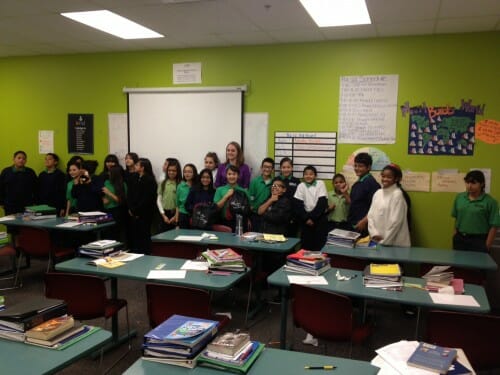Arizona and the Case For School Choice
Five of the nation's top 10 high schools are in Arizona — and they're all branches of the same charter school.
According to U.S. News and World Report, Basis Scottsdale is the nation's top-performing high school, followed by Basis Tucson North and Basis Oro Valley. Basis Peoria and Basis Chandler were ranked fifth and seventh, respectively.
The rankings consider students who exceeded state standards, graduation rates and college preparedness, according to U.S. News.
Two additional Arizona charter schools, along with two "special function" public schools, made the top 100.
Arizona was one of the earliest adopters of charter schools in 1994, and it continues to be at the forefront of school choice. However, the state has some of the lowest school funding and teacher pay in the U.S.
I love that last line. Makes one question if the obsession on teacher pay and funding for bloated school administrations really is the key to education improvement. I wonder if when the Arizona Republic writes their inevitable next article on Arizona having lower teacher pay they will add a clause that says "However, the state has five of the nation's 10 top charter schools".
This is a fascinating article and I encourage you to read the whole thing. The article gives plenty of space to opponents of school choice and charter schools:
[Arizona Education Association President Joe] Thomas said any public school district in Arizona could replicate the Basis model if they were also allowed to work only with a small number of high-achieving students and "force the rest out of your school."
This inference that Basis gets its results by carefully cherry-picking students is undermined by facts from the same article:
There are no entry requirements or exams to get into a Basis school — just a game of luck. An annual lottery determines which new students are accepted.
Already, Basis schools have received 15,000 applications for 1,000 open spots for next school year, Bezanson said.
To be fair, since Basis does not participate in the free school lunch program and the city school bus program won't deliver kids to Basis, there are kids that probably are not able to apply, but again, this is far from a case of cherry-picking. It is a case of setting very high expectations and expecting kids to achieve that. Thomas's comment on this reflects the different philosophy of teachers unions vs. school choice folks:
Thomas said Basis schools are great for the small minority of kids who can succeed in the high-pressure environment. But most students don't — and public schools have the expectation to teach all students.
This is partially true, the Basis approach is not right for all kids, but given they have 15 applications for every 1 open lottery spot, it is right for a lot apparently. But the difference in philosophy is that public school advocates want to force the Basis kids that are able to achieve at a high level into dumbed-down, plodding schools, moving no faster than the lowest common denominator. School choice advocates, on the other hand, also acknowledge this difference, but rather than enforcing a one-size-fits-all public solution, advocate for a thousand flowers to bloom with many different school solutions.
There are many other charter schools in town that do a great job with kids of different needs. My wife and I support a Teach for America teacher at a charter school in South Phoenix. The kids in her class are mostly all Hispanic, many have parents that do not speak English and a high percentage are on the school lunch program. These kids may not be quite at the Basis level, but they out-achieve most of the Phoenix public school system and are well beyond what kids from similar demographics are doing in local government schools.
